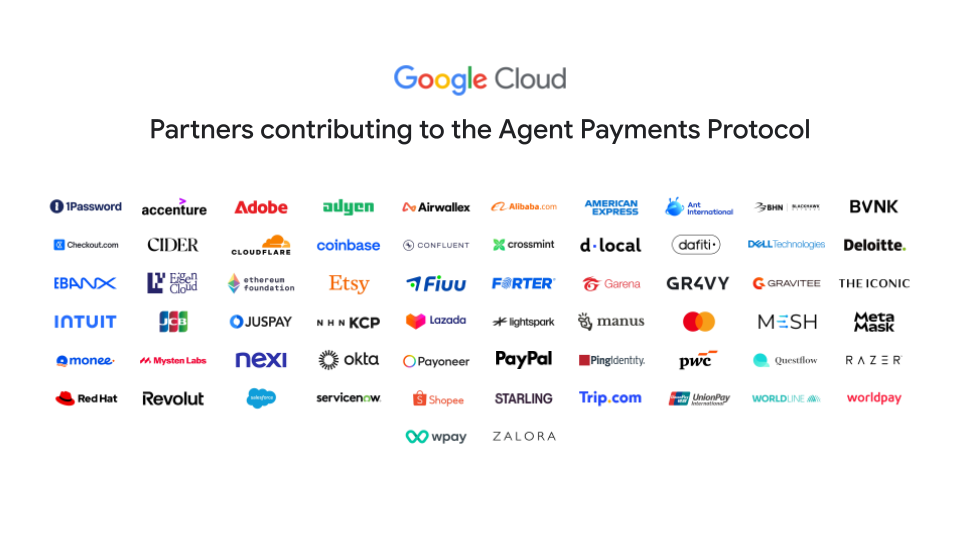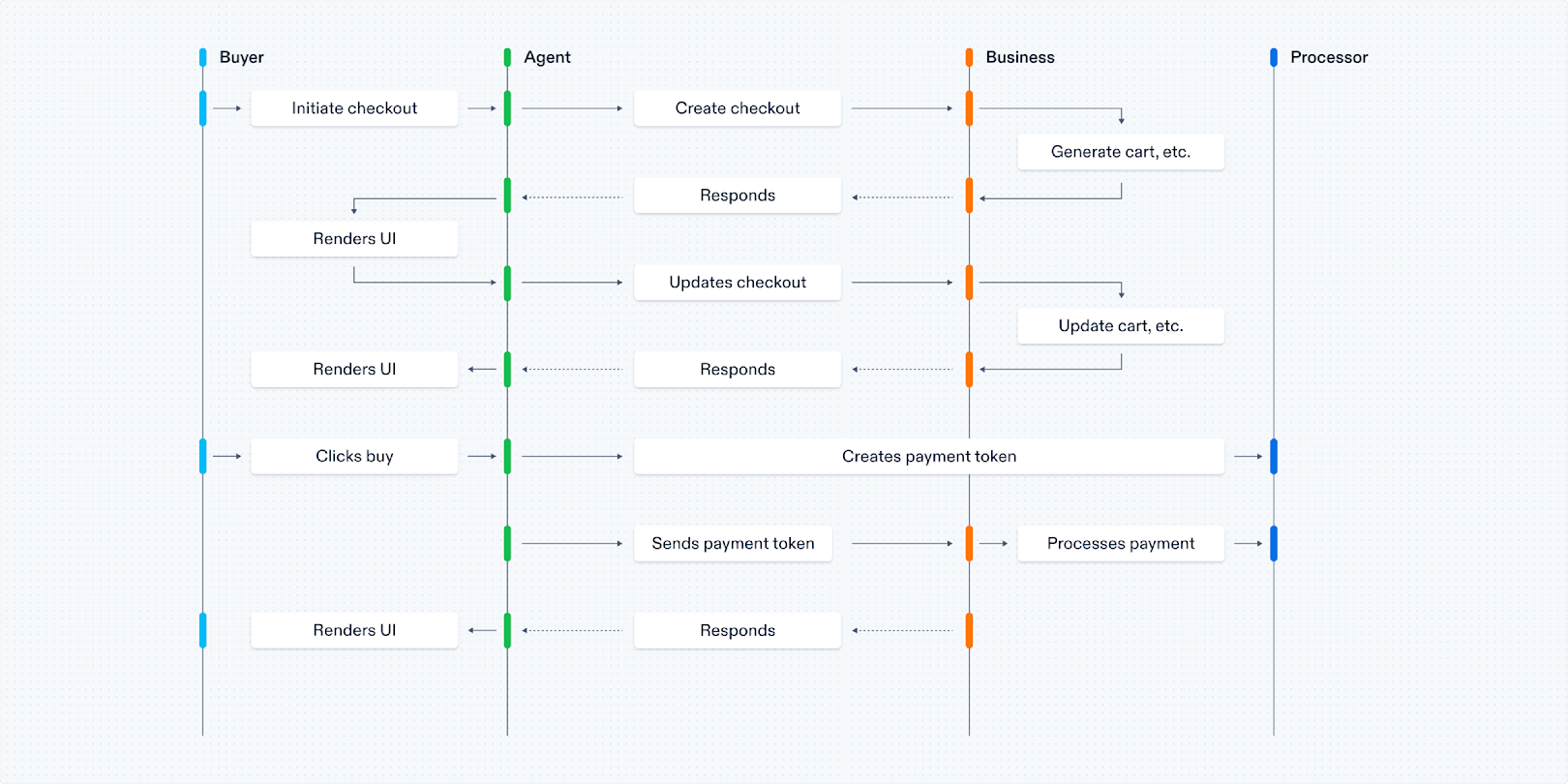Today I want to talk about something really exciting happening in AI right now: AI agents that can actually buy things for you.
Two major protocols were just announced in September 2025—Google's Agent Payments Protocol (AP2) and OpenAI's Agentic Commerce Protocol (ACP)—and they're both trying to solve the same fundamental problem in very different ways. Let me explain what's happening and why it matters.
Why This Matters?
Think about how you shop online today. You search for something, compare options, add items to a cart, enter your payment details, and click "buy." Every step assumes you are there, clicking buttons.
But what if your AI assistant could do all of this for you? Imagine saying: "Find me running shoes under $100 that are good for marathons and buy them when you find a great deal." Then you go about your day, and the AI handles everything—searching, comparing, negotiating, and completing the purchase when conditions are right.
This is called agentic commerce, and it's about to transform how we shop online. But here's the challenge: our entire payment infrastructure was built for humans, not AI agents. When an AI makes a purchase, critical questions arise:
- Authorization: How do we prove you actually wanted this purchase?
- Authenticity: How does a merchant know the AI isn't hallucinating or making mistakes?
- Accountability: If something goes wrong, who's responsible?
Both Google and OpenAI recognized this problem and created protocols to solve it. Let's break down how each approach works.
Google's AP2: Building Trust Through Cryptographic Proof
Google's Agent Payments Protocol (AP2) launched in September 2025 with backing from over 60 organizations including Mastercard, American Express, PayPal, Salesforce, and many others. Think of AP2 as creating a universal rulebook for how AI agents can make payments across any platform.
How AP2 Works: The Mandate System
The core innovation in AP2 is something called "Mandates"—these are tamper-proof, cryptographically-signed digital contracts that serve as verifiable proof of your instructions. Here's a simple analogy: imagine giving someone a notarized letter that says exactly what you want them to buy and under what conditions. That letter can't be changed, everyone can verify it's authentic, and it creates a clear paper trail.
AP2 uses two types of mandates:
- Intent Mandate: This captures what you're looking for. For example: "Find me a bicycle for under $500 for a trip on November 10th."
- Cart Mandate: Once the agent finds something specific, you approve the final purchase. This creates an unchangeable record of exactly what you're buying at what price.
For fully automated purchases where the agent buys without you present, AP2 requires a more detailed Intent Mandate that specifies price limits, timing, and other rules. Think of this like setting up automatic bill payments, but with much more sophisticated conditions.
What Makes AP2 Special
- Payment Agnostic: AP2 supports everything from credit cards to stablecoins and real-time bank transfers—it works with any payment method. This is like having a universal adapter that works in any country.
- Broad Ecosystem: With backing from major financial institutions and payment providers across multiple sectors, AP2 is positioned to become an industry-wide standard.
- Comprehensive Audit Trails: Every transaction has cryptographic proof linking your original request to the final payment, making disputes and fraud investigation much clearer.

Use Cases for AP2
AP2 shines in scenarios requiring robust authorization and industry-wide interoperability:
- E-commerce and travel booking: An agent books your flight and hotel together, staying within your $700 budget
- Enterprise procurement: Your company's AI automatically reorders office supplies from approved vendors when inventory runs low, with built-in spending limits
- Subscription management: Agents that can negotiate and manage multiple subscriptions across different platforms
- Time-sensitive purchases: Automatically buying concert tickets the moment they go on sale
OpenAI's ACP: Merchant-First, Quick Integration
Just days after AP2's announcement, OpenAI and Stripe released the Agentic Commerce Protocol (ACP) and launched "Instant Checkout" in ChatGPT—making it the first agentic commerce protocol to actually go live with real consumers.
How ACP Works: Keeping Merchants in Control
ACP takes a different philosophical approach. Instead of building a comprehensive industry-wide standard from the ground up, ACP focuses on making it extremely easy for existing businesses to enable AI-driven purchases without changing their current systems.
When someone places an order in ChatGPT, the order details flow to the merchant's backend via ACP. The merchant accepts or declines the order, charges the payment method, calculates taxes, and handles fulfillment exactly as they do today—merchants remain the merchant of record throughout the entire purchase journey.
Here's the brilliant part: If a merchant already processes payments with Stripe, they can enable agentic payments with as little as one line of code. If they use another payment processor, they can still participate using Stripe's Shared Payment Token API without changing their existing provider.
What Makes ACP Special?
- Fast Time-to-Market: ACP is already live in ChatGPT for U.S. users, with Etsy sellers available now and over a million Shopify merchants coming soon. While AP2 is still being adopted, ACP is already processing real transactions.
- Low Integration Friction: The protocol is designed to work with existing commerce infrastructure, making adoption much faster for businesses.
- Merchant Control: Businesses maintain complete control over what products can be sold, how they're presented, pricing, and fulfillment—they're not giving up their customer relationship to a platform.
- Privacy and Security: Encrypted payment tokens are only authorized for specific amounts and specific merchants, and only the minimum data necessary is shared.

Use Cases for ACP
ACP is optimized for scenarios where deep integration with ChatGPT and rapid merchant adoption matter most:
- In-conversation shopping: A user asks "What's a good gift for someone who loves ceramics?" and can buy directly in the chat
- Digital goods and services: Quick purchases of digital products, subscriptions, or services
- Personalized recommendations: ChatGPT uses conversation context to suggest and sell products that match specific needs
- Impulse-friendly purchases: Single-item purchases where the conversation naturally leads to buying
Currently, ACP only supports single-item purchases, but OpenAI plans to add multi-item carts and expand to more regions and merchants.
Key Differences: A Side-by-Side Comparison
Let me break down the core differences in a way that's easy to understand:
- Philosophy
Google AP2: "Let's create a universal standard that works everywhere, with cryptographic proof for every transaction."
OpenAI ACP: "Let's make it super easy for businesses to start selling through AI agents using their existing systems."
- Ecosystem Approach
AP2: Backed by 60+ organizations including major payment networks, banks, and technology companies—aiming to be the industry-wide standard. Think of it like how HTTP became the standard for web communication.
ACP: Built by OpenAI and Stripe, open-sourced for anyone to implement, with focus on making ChatGPT a commerce platform. More like how Stripe made online payments easy 15 years ago.
- Security & Trust Model
AP2: Heavy emphasis on cryptographically signed mandates and verifiable credentials, creating immutable audit trails. Maximum accountability across the entire ecosystem.
ACP: Users explicitly confirm each step; payment tokens are encrypted and authorized only for specific merchants and amounts. Trust is built through user control and merchant responsibility.
- Payment Flexibility
AP2: Truly payment-agnostic—supports traditional cards, bank transfers, stablecoins, cryptocurrencies via x402 extension. Designed for the full spectrum of payment types.
ACP: Works with any payment processor but currently focuses on traditional payment methods through Stripe's infrastructure and other compatible processors.
- Market Status
AP2: Specification is published, partnerships are announced, but not yet available in consumer-facing products. Think of it as "building the foundation."
ACP: Already live and processing real transactions in ChatGPT. Think of it as "ship now, iterate fast."
- Integration Complexity
AP2: More comprehensive but requires broader ecosystem coordination. Organizations need to implement mandates, verifiable credentials, and integrate with multiple parties.
ACP: Designed for minimal friction—merchants can participate without overhauling their tech stack. One line of code if you're already using Stripe.
Which One Will Win?
Here's my take: both can succeed, and in fact, they might complement each other.
Think of it this way: When the internet was young, we had different protocols for different purposes. HTTP for web pages, SMTP for email, FTP for file transfers. Eventually, the best protocols became standards, and sometimes multiple protocols coexisted because they solved different problems.
AP2 is positioning itself as the comprehensive standard—the TCP/IP of agentic payments. It could become the middleware standard for financial transactions initiated by autonomous systems. If you're building enterprise procurement systems, managing complex multi-party transactions, or need robust audit trails for compliance, AP2's cryptographic mandates provide the security and accountability you need.
ACP is optimized for speed and merchant adoption. It's already live, it's easy to implement, and it works with existing infrastructure. For businesses that want to start selling through ChatGPT today—especially those already using Stripe—ACP is the clear choice.
The fact that ACP is the first to move from specification to deployment gives OpenAI a significant first-mover advantage, while AP2 aims to become a broader industry standard across multiple platforms and payment networks.
What This Means for You?
If you're a business owner or developer:
- If you want to sell through ChatGPT quickly: Start with ACP. The integration is straightforward, and you can be live in days.
- If you're building enterprise systems or planning for multi-platform agent commerce: Pay attention to AP2. Its broader industry backing and comprehensive approach may make it the long-term standard.
- Ideally: Watch both closely. The winning strategy might be supporting both protocols.
If you're a consumer:
- Try Instant Checkout in ChatGPT if you're in the U.S.—it's a glimpse of how shopping will work in the future.
- Watch for AP2-enabled experiences as they roll out. The cryptographic proof and audit trails mean more protection for you.
- Remember: You're still in control. These protocols are designed to empower agents to act on your behalf, not to take away your authority.
The Bigger Picture
What excites me most isn't just the technical details—it's what this enables. We're moving toward a world where AI agents can truly act as our assistants, not just our advisors. They can research, negotiate, and transact on our behalf, freeing us to focus on higher-level decisions and goals.
Google described use cases like a shopper asking for a bicycle and the merchant's agent creating a custom, time-sensitive bundle offer that includes the bike, helmet, and travel rack at 15% discount—turning a simple query into a more valuable sale. This level of personalization and coordination between buyer agents and seller agents is only possible with protocols like these.
Both AP2 and ACP are tackling the same fundamental challenge: how do we maintain trust, security, and accountability when AI agents enter the commerce loop? They've just chosen different paths to get there. AP2 is building the comprehensive infrastructure, while ACP is shipping the product.

